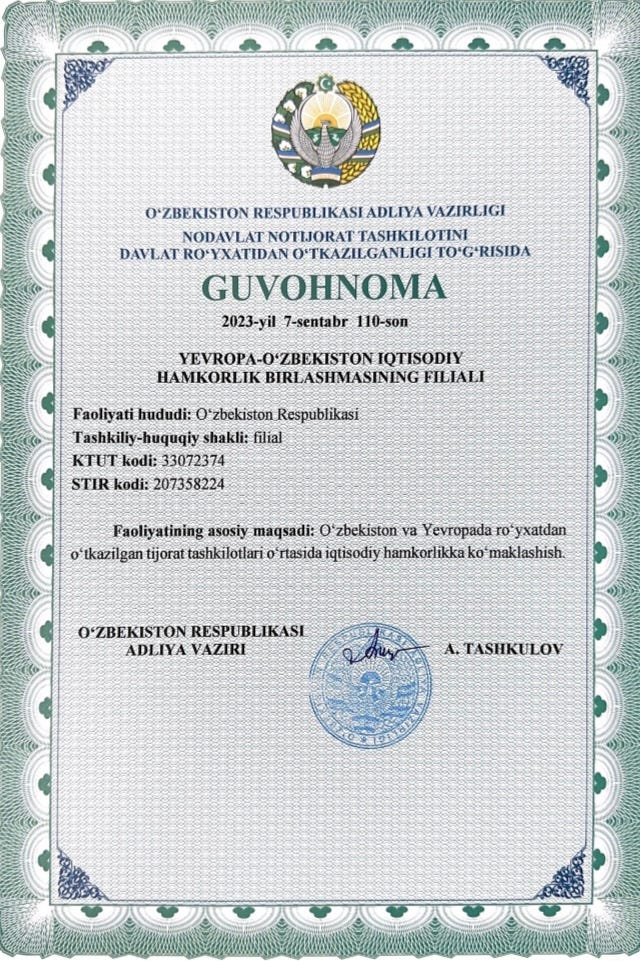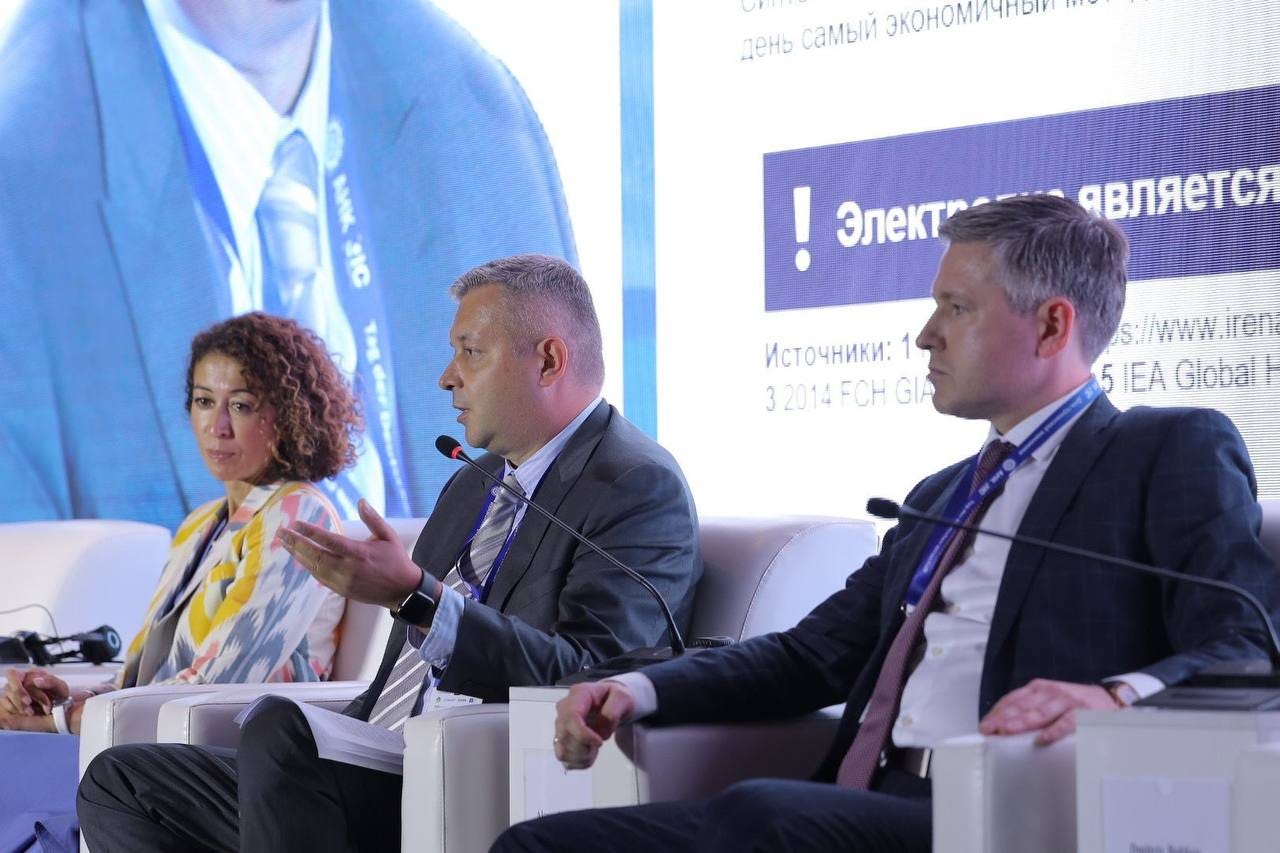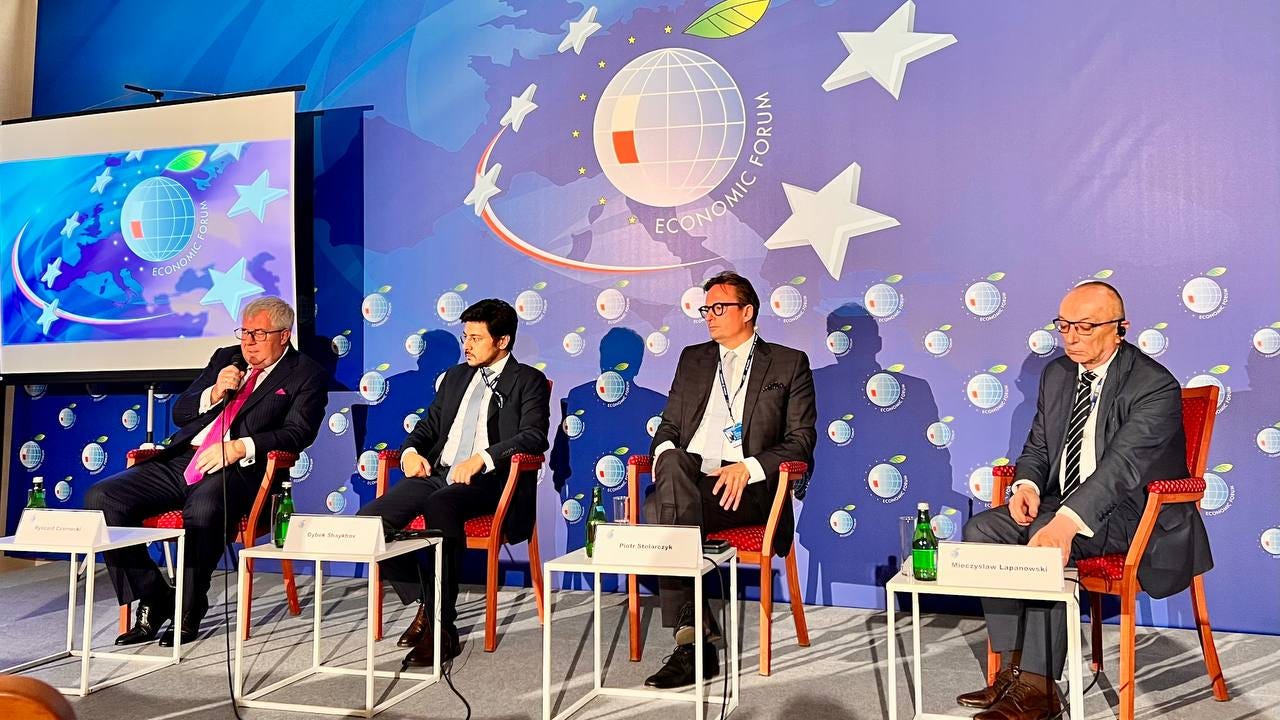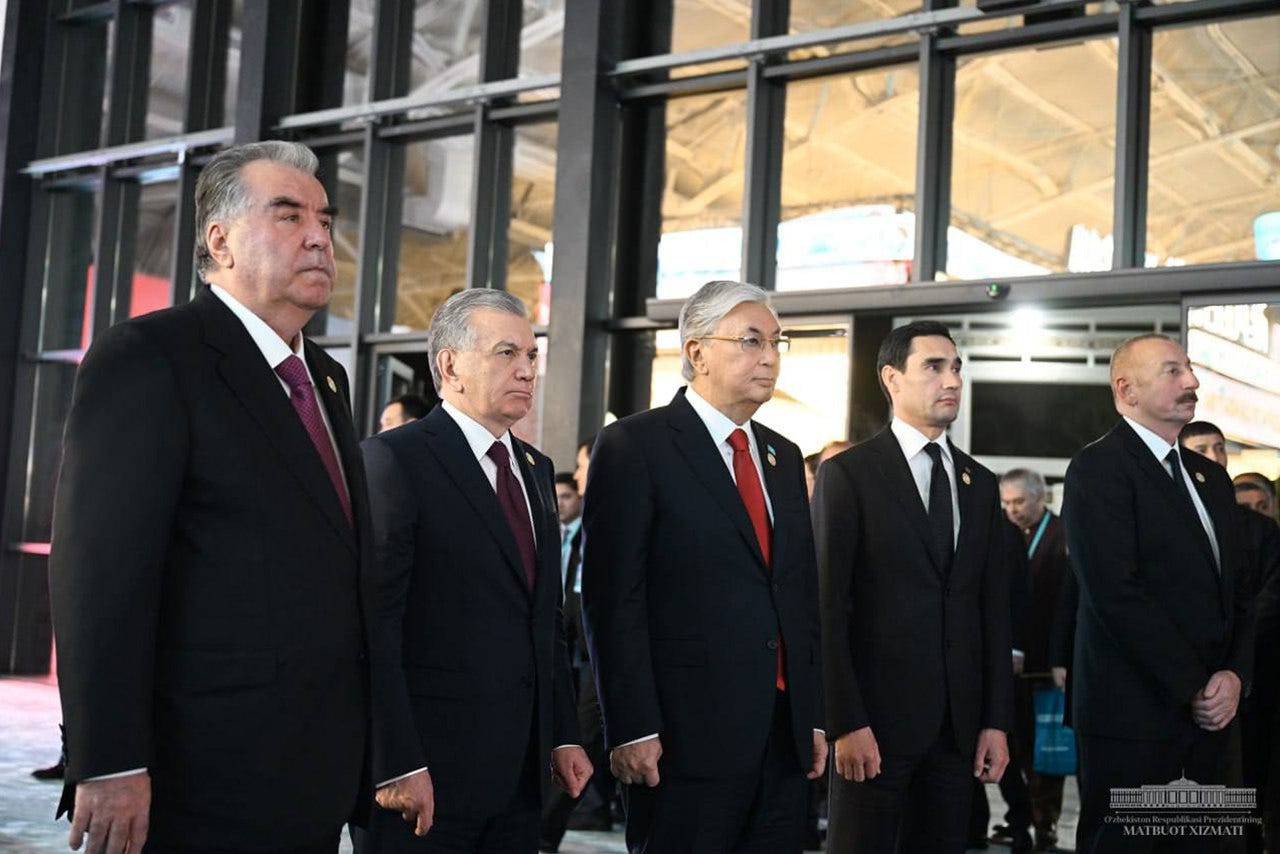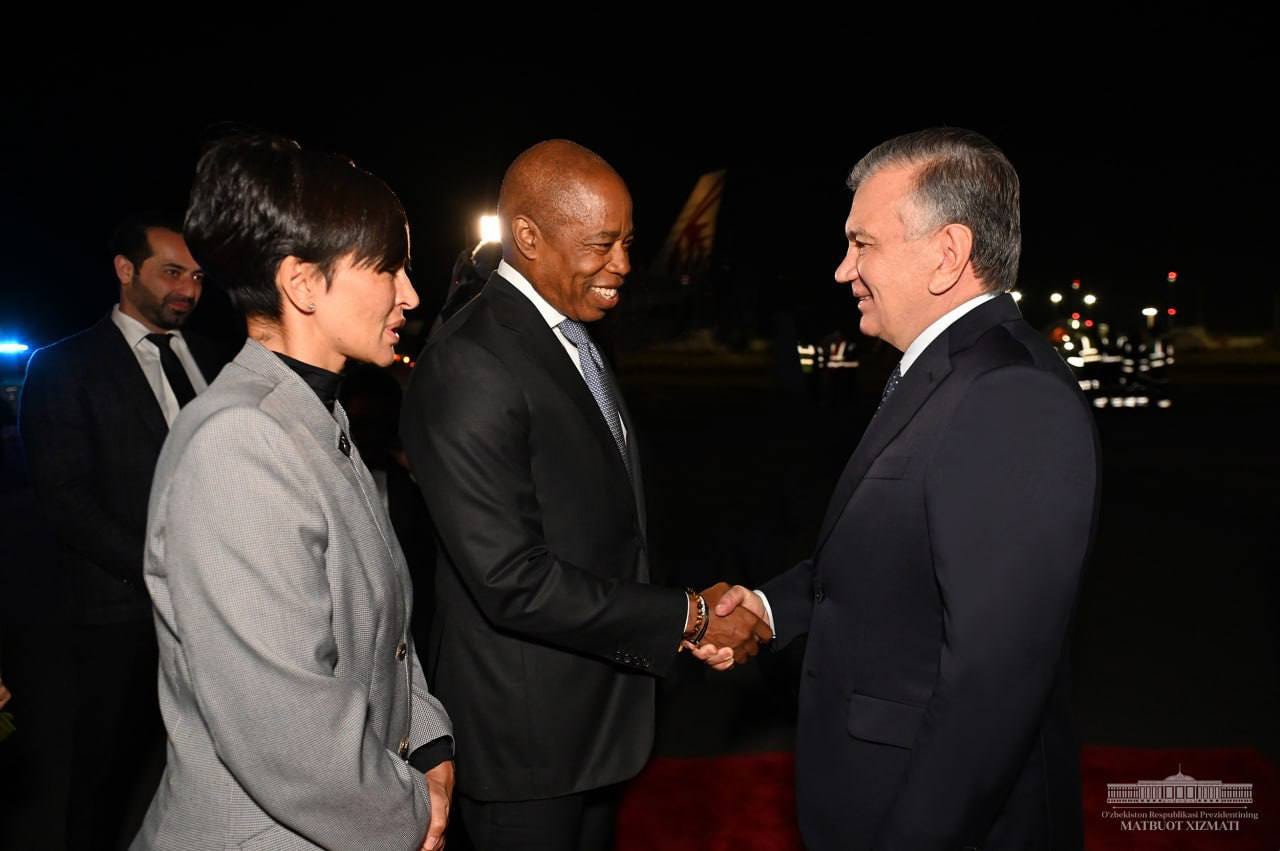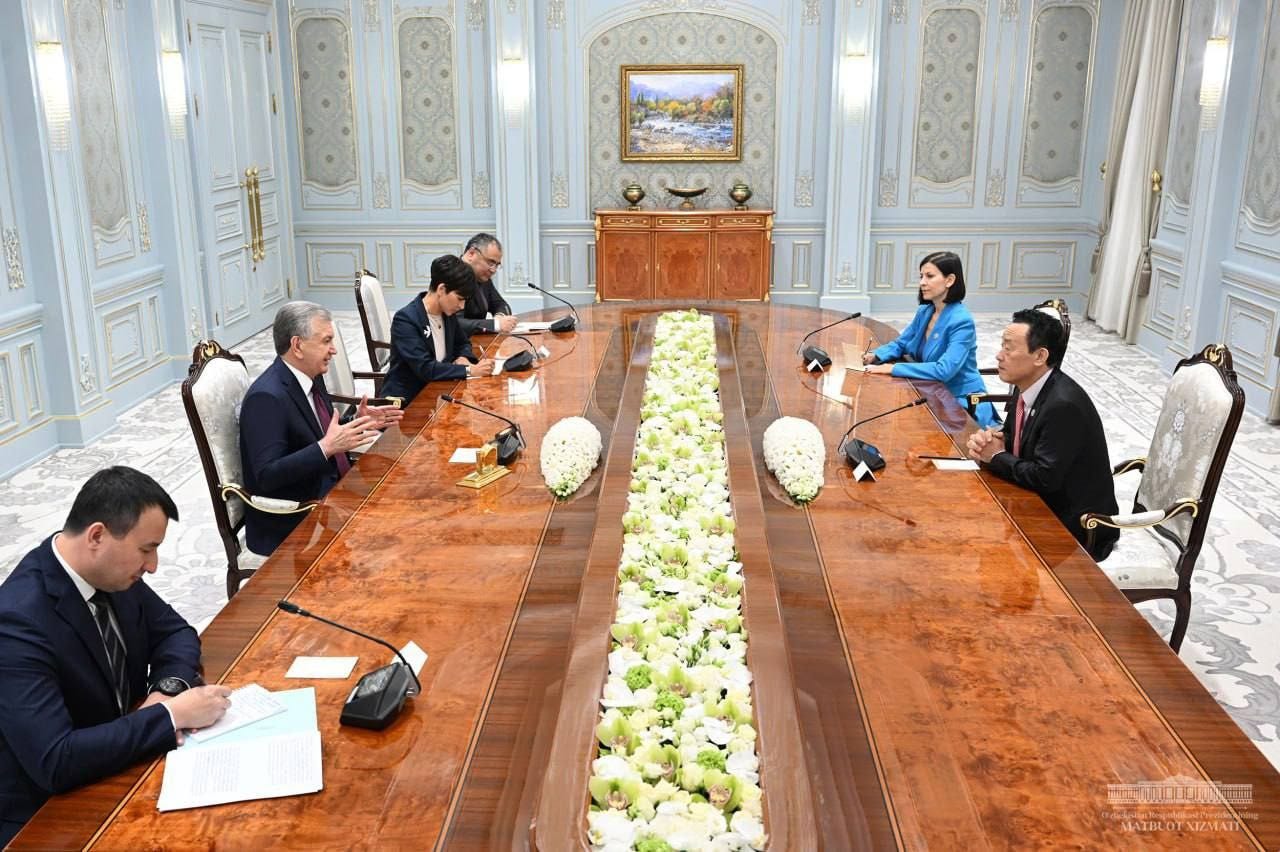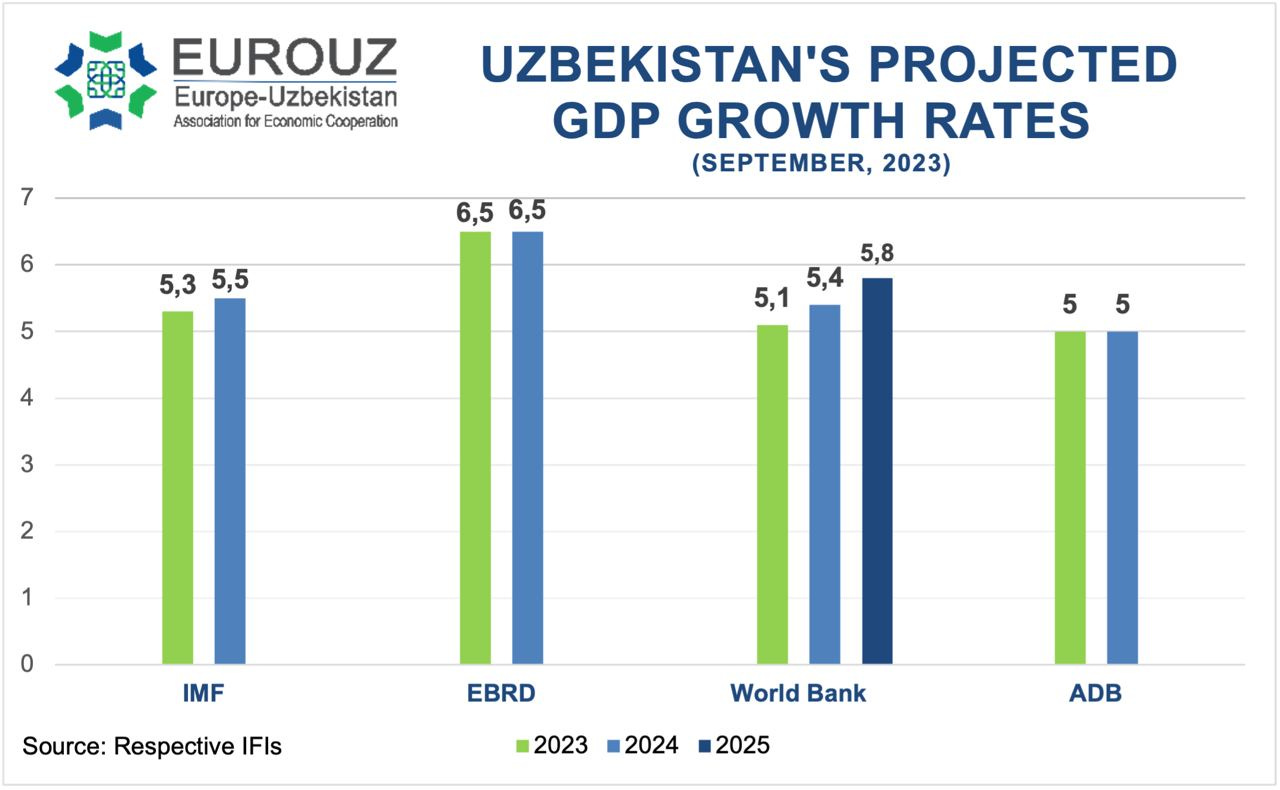Uzbekistan Update: September 1-15, 2023
Biweekly update on key developments in Uzbekistan
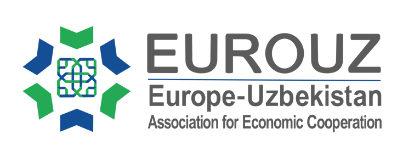
Notable Quotes
“In philosophy, there is such a concept: a decision that the society has not accepted is a wrong decision, no matter what goal it pursues”
The Chairman of the Central Bank rescinding imposed restrictions on foreign exchange transactions after a significant public backlash.
UPCOMING EVENTS
I. 1st Annual Europe-Uzbekistan Business Meetings
Date: Friday, 27 October, 2023
Time: 09:30-17:00 Brussels time
Type: In-person
Location: Brussels, Belgium
EUROUZ is organizing the First Annual Business Meeting Europe-Uzbekistan in Brussels with the participation of high-ranking representatives of the government of the Republic of Uzbekistan and the European Union, as well as European companies and investors from throughout the European Union.
You can find the program on the event website.
II. Open Life Sciences & Healthcare Committee initiation meeting.
Date: Friday, 22 September, 2023
Time: 14:00-16:00 Tashkent time | 11:00-13:00 CET time
Type: Hybrid
Location: Tashkent, Uzbekistan
Healthcare & Life Sciences Committee aims to establish a collaborative platform that unites manufacturers and suppliers of pharmaceuticals, medical devices, and medical equipment from Uzbekistan and the European Union, along with healthcare organizations, legal professionals, and other relevant firms. The committee's primary focus is to address pertinent healthcare matters concerning pharmaceuticals, medical advancements, and the evolution of Uzbekistan's healthcare system.
III. ESG Committee initiation meeting
Date: Friday, 29 September, 2023
Time: 15:00-17:00 Tashkent time | 12:00-14:00 CET time
Type: Hybrid
Location: Tashkent, Uzbekistan
The committee aims to support the EUROUZ Members’ ongoing commitment to environmental stewardship, health and safety, corporate social responsibility, corporate governance, sustainability, and international best practices in corporate compliance as relevant to the Members’ business activities and the business environment in Uzbekistan.
EUROUZ & MEMBER NEWS
I. EUROUZ Tashkent branch state registration is finalised!
We are thrilled to announce that our Tashkent representative office has become a formal EUROUZ branch office in Uzbekistan. We look forward to welcoming all our members to our renewed Tashkent office.
II. EUROUZ welcomes a new Association member - KPMG.
KPMG is a 'Big Four' firm, a global network of independent member firms providing Audit, Tax, and Advisory services. The firm operates in 143 countries and has 265,000 people working in member firms around the world.
KPMG in Uzbekistan has 3 registered legal entities with more than 300 professionals, providing Audit and Consulting, Deal Advisory, Tax, and Legal services.
For more information, visit: http://www.kpmg.co.uz
We look forward to supporting KPMG in #Uzbekistan and #Europe.
III. Days of German Economy in Tashkent
On September 14th, the EUROUZ was the official event partner of the “Day of the German Economy in Uzbekistan” conference in Tashkent, co-organized by our partner AHK Zentralasien. The event attracted over 300 attendees, including German and Uzbek business leaders, investors, and government officials.
We sincerely thank EUROUZ member ENERA for sponsoring this important event in Uzbekistan’s business calendar and all our members who joined us for a memorable networking dinner at the residence of the Federal Republic of Germany’s Ambassador to Uzbekistan.
The event showcased the strength and value of the EUROUZ business community, highlighting numerous collaboration opportunities.
IV. EUROUZ takes part in the Economic Forum in Poland
On September 5, Mr. Oybek Shaykhov, EUROUZ Secretary-General, took part in the 32nd Annual Economic Forum in Poland as one of the conference speakers.
Addressing two panels moderated by the Member of the European Parliament Mr Ryszard Czarnecki, the EUROUZ Secretary-General, delved into Uzbekistan's economic growth and welcoming stance towards foreign investments.
V. EUROUZ Congratulates Member BMB Trade Group on Transformative Rebranding to BMB Holding and on the Doustlik award from the President of Uzbekistan
EUROUZ congratulates its members, BMB Trade Group, on its strategic rebranding to BMB Holding. This transformation in legal structure signifies a pivotal move towards fostering extensive collaborations with international financial institutions, leading banks, and multinational corporations, enhancing Uzbekistan's global image through transparency and attracting foreign investment for economic growth.
At the same time, we join the Uzbek business community in congratulating Mamatkulov Bekzod Akmalovich, Chairman of the Supervisory Board of BMB Holding, on receiving the 'Doustlik' award from the President of Uzbekistan for his significant contribution to enhancing the economic strength and export potential of the Republic.
VI. We are now in Telegram! Join us
We are excited to share some great news - we've launched two EUROUZ official Telegram channels: one for the public and one for members only.
We will be sharing:
Latest news on significant economic, political, and policy developments in Uzbekistan.
Uzbekistan Market updates.
Members' news and information on the upcoming events.
Subscribe to our Telegram channel and invite others: https://t.me/eurouz_official
Not a member yet?
Join EUROUZ to access exclusive market support for your business activities in the country.
1. INTERNATIONAL COOPERATION
1.1 CENTRAL ASIA & CAUCASUS
Source: The Presidential Administration of Uzbekistan.
The President of Uzbekistan put forward several proposals aimed at an even closer partnership in the region, in particular:
establishing the Economic Council of Central Asian countries;
creating the long-term Industrial Cooperation Development Strategy of the region;
drafting an Agreement on Transport and Transit;
forming specific mechanisms for the development of effective transport corridors to access the markets of China, the countries of South Asia and the Middle East, as well as the European Union;
constructing new trunk networks for the supply of electricity;
preparing a Regional Partnership Program on food security with FAO's support;
establishing a multilateral platform - Central Asia Dialogue on Climate to form a single climate agenda of the region;
developing an Intergovernmental Program to protect and strengthen the borders of Central Asian countries;
forming a Regional System for forecasting emergency situations, their prevention, early warning, and joint counteraction;
establishing a Dialogue Group at the level of Special Representative of Central Asian countries on Afghanistan.
1.2 RUSSIA & CHINA
Uzbekistan has emerged as one of the top destinations for Russian tourists.
The number of Russian citizens traveling to the country for tourism has doubled in the past six months. According to the Russian Union of Travel Industry, the most sought-after destinations among Russian tourists in the Commonwealth of Independent States (CIS) include Belarus, Uzbekistan, and Armenia.
To address this labor shortage, the minister proposed expanding the national project to increase labor productivity and actively engaging labor migrants in the Russian economy, particularly from Central Asia, despite competition with other countries for this workforce.
From January to August, over 28,200 Uzbek citizens left for work abroad through organized recruitment, with nearly three-quarters (20,450 people) heading to Russia, marking a 12-fold increase since late spring. Furthermore, a recruitment project for Uzbek workers in the construction sector in Russia was initiated by a Russian government resolution in October 2021. A total of 4,750 Uzbek labor migrants arrived at Russian construction sites as part of this project.
1.3 NORTH & SOUTH AMERICAS
This visit anticipated the visit of the President to the United States this week. During the delegation's visit, discussions focused on strengthening bilateral cooperation in various areas. The visit also marked the launch of the Uzbek-American IT Association TechBridge, aimed at strengthening partnership ties in the information and communication sphere. Additionally, agreements were reached to revitalize cooperation on issues such as reinstating Uzbekistan's beneficiary status under the GSP program, organizing the 7th meeting of the working group on Uzbekistan's accession to the WTO, and establishing a joint consultative platform to remove trade barriers.
The first agreement designates Uzbekistan as one of the 50 partner countries in the U.S. Global Health Security Program, where the U.S. provides enhanced support for healthcare security. Additionally, a memorandum of understanding between the Ministry of Health of Uzbekistan and USAID was signed to expand access to safe and high-quality medicines, particularly for tuberculosis treatment, in Uzbekistan.
1.4 MIDDLE EAST & SOUTH-EAST ASIA
The UN cut food aid to Afghanistan due to the lack of funds.
The United Nations World Food Programme (WFP) is forced to reduce assistance to two million Afghan residents due to a "massive funding shortfall." The organization reports that up to 10 million Afghans have lost WFP support this year. In the future, WFP will only be able to provide emergency aid to three million people per month due to the funding deficit. In March, WFP had to reduce rations from 75% to 50% for communities facing acute hunger levels. The funding cuts mean that 1.4 million pregnant women, nursing mothers, and their children will no longer receive specialized nutrition to prevent malnutrition.
He addressed the issue of Afghanistan's construction of the Kushtep Canal, which originates from the Amu Darya River, and suggested forming a working group to study the canal's impact and inviting Afghan representatives to the regional dialogue on shared water resources. He also pointed out that Afghanistan, as a new participant in the region's water use, is not bound by any obligations to the neighboring countries.
Uzbekistan and Israel lift restrictions on air travel.
Representatives from Uzbekistan and Israel have signed a protocol to remove restrictions on the number of airlines and destinations for air travel between the two countries. The protocol amends the intergovernmental agreement on air travel dated July 4, 1994.
Uzbekistan agreed with South Korea to repay USD 1 billion of debt in a gas project.
The government has agreed to compensate South Korea's outstanding debt of USD 1 billion in the joint gas project Uz-Kor Gas Chemical, which extracts gas from the Surgil field in Karakalpakstan. Uzbekistan and South Korea reached this agreement during the visit of South Korea's Vice Premier and Minister of Economy and Finance to Tashkent on September 7th. The project, known as the Ustyurt Gas Chemical Complex, began in 2008, and the joint venture Uz-Kor Gas Chemical started gas production in 2016.
Uzbekistan and South Korea have signed the Trade and Investment Promotion Framework (TIPF) program.
Uzbekistan became the first country in Central Asia and the seventh worldwide to sign such an agreement, which aims to enhance economic cooperation and trust, particularly in supply chain development, digital technology, and biotechnology.
1.5 INTERNATIONAL ORGANIZATIONS
Source: The Presidential Administration of Uzbekistan.
During his speech, the President plans to inform the international community about the reform process in Uzbekistan and achievements in modernizing the socio-political sphere, as well as present several important initiatives with both regional and global significance. Additionally, at the invitation of U.S. President Joe Biden, Mirziyoyev will participate in the inaugural summit of U.S. and Central Asian leaders in the "Central Asia - U.S." format.
2. PUBLIC POLICY
Source: The Presidential Administration of Uzbekistan.
The discussions aimed to elevate cooperation to a new level, and the President announced plans for the country to adopt a new roadmap to strengthen its partnership with the FAO. They also agreed to include joint initiatives in the new Uzbekistan-FAO Cooperation Program until 2030, focusing on modernizing agriculture, digitizing the agricultural sector, and implementing new efficient financial instruments.
The President has officially approved the "Uzbekistan-2030" Strategy.
This strategy reflects key ideas, including achieving above-average income through sustainable economic development, establishing an education, healthcare, and social protection system that meets people's needs and international standards, creating favorable environmental conditions, constructing a just and modern state that serves the people, and guaranteeing sovereignty and national security.
The new investment legislation, which focuses on FDI and private investment, will clearly outline market entry rules, guarantee equal treatment for foreign investors and their investments, and provide investors access to international resolution mechanisms. Additionally, the IFC will support the Uzbek government in implementing regulations that allow private sector participation in the creation and operation of Special Economic Zones (SEZs) and ensure that their site selections are based on proper feasibility studies and sustainability analyses. Currently, SEZs are exclusively managed and selected by the government.
On September 15th, the regulator announced its decision to limit operations related to the purchase of foreign currency and foreign exchange transactions for business entities to only banks where they hold their main accounts. Additionally, the regulator instructed to implement stricter controls over transactions involving the sale of foreign currency to entrepreneurs, with currency sales requiring approval from a bank's senior management. However, these new restrictions on foreign exchange transactions faced significant public backlash. Therefore, on September 17th, the Chairman of the Central Bank rescinded the imposed restrictions, emphasizing that 'a decision disapproved by society is a wrong decision.'
Deputies of Uzbekistan adopted amendments enshrining the secularism of the state.
In a plenary session of Uzbekistan's Legislative Chamber of the Oliy Majlis on September 5th, lawmakers passed a set of amendments to the Administrative Responsibility Code and Criminal Code, establishing a legal foundation for defining Uzbekistan as a secular state. These amendments introduce penalties for promoting the superiority or inferiority of citizens based on their national, racial, ethnic, or religious backgrounds. The legislation also imposes administrative penalties for concealing one's identity through clothing in public spaces, with exceptions for medical reasons, work attire, safety gear, and special headgear for road safety and sporting events.
The limit on the export of foreign currency from Uzbekistan without a declaration will be increased.
The Cabinet of Ministers of Uzbekistan has amended the Rules for the Import and Export of Cash Foreign Currency by Individuals across the country's borders. Now, individuals can import and export cash currency up to an equivalent of UZS 100 million (approximately USD 8,239 at the Central Bank's exchange rate as of September 5th), an increase from the previous limit of UZS 70 million. The rules also allow individuals to seek consultation from customs officers on how to complete the declaration when carrying currency exceeding the specified limit before going through customs.
The draft master plan of New Tashkent was presented to the President.
The President reviewed the master plan for the New Tashkent city project, a new urban development initiative outside the capital city aimed at accommodating the country's growing population and modernizing infrastructure. Key features include government offices, the University of New Uzbekistan, cultural institutions, business and innovation districts, and extensive green spaces, with a central park, artificial canals, and lakes.
This marks the first time that Uzbekistan has hosted this significant event, which gathers leaders from governmental tourism agencies, international organizations, and representatives of the tourism industry from around 160 countries. The session will include an investment forum to attract targeted investments into the country and an educational forum showcasing the latest developments in tourism education, focusing on international sustainable tourism.
The composition of the Presidential Council for Business Support has been updated.
The President has approved changes to the composition of the Public Council for Entrepreneurship Support, a consultative body responsible for developing initiatives to remove barriers to business and ensure the effective implementation of business-related initiatives from government agencies. The council's membership has increased from 22 to 30, with fewer officials included. New members of the council include individuals from various business sectors and organizations representing engineers, businesswomen, and tax consultants, among others. Council meetings will now be held at least once a month to discuss legislative acts regulating entrepreneurial activities before undergoing legal expertise by the Ministry of Justice.
Full implementation of mandatory health insurance in Uzbekistan is planned until the end of 2026.
According to a Presidential decree, starting from January 1, 2024, the State Medical Insurance Fund will be transferred to the structure of the Ministry of Health while maintaining its status as an independent legal entity, as well as its existing sources and funding procedures. The fund's supervisory board will independently determine healthcare service providers (both state and non-state), and the volume of purchased medical services within the guaranteed volume of medical care, and will manage its budget.
The temporary import of aircraft into Uzbekistan is planned to be simplified.
The government plans to simplify the temporary import of aircraft to promote the development of private airlines. This initiative, outlined in a "roadmap" attached to the President’s decree, aims to exempt aircraft temporarily imported under lease and rental agreements, with a production age of up to 25 years, from periodic customs payments.
The President has instructed the Ministry of Economy and Finance to draft a law aimed at stimulating investments in the local stock market. The draft legislation should include an extension of tax benefits for investors, such as exempting individuals from personal income tax (PIT) on dividends from stocks and interest on bonds, as well as tax exemptions on incomes directed to personal investment accounts for purchasing securities on the local stock market, with a maximum amount of 100 times the minimum wage. Additionally, the National Agency for Project Management (NAPP) will be responsible for licensing the insurance industry and securities trading, taking over the Information and Resource Center of the stock market, and the Unified Corporate Information Portal.
The Tashkent city administration has set up a support headquarters for industrial enterprises to coordinate efforts in maintaining industrial production and fostering industrial sector development. This new structure operates 24/7 and involves representatives from government agencies responsible for various economic aspects, including investments, taxation, banking, energy, and standards. Their collaboration aims to ensure swift problem-solving for businesses. Entrepreneurs can contact the headquarters using the provided phone numbers: (+998) 71 210-01-15 and (+998) 71 210-01-16.
This approach includes evaluating the activities of government officials and their deputies based on public sentiment and expanding electronic channels for citizens to address state entities, with the goal of ensuring more than 80% of inquiries are resolved on the spot.
He criticized religious excesses and stressed the need for a reasonable and accurate interpretation of Islamic practices. He highlighted that Islam is a universal religion that does not prescribe a specific dress code for all nations and cultures, urging people to be moderate in their attire and avoid excessive or inappropriate clothing choices. This message from the Mufti comes at a time when there are discussions in Uzbekistan about introducing administrative penalties for wearing clothing that conceals one's identity in public places.
3. LEGISLATION
3.1. LEGISLATIVE CHANGES
Legislative amendments approved to align with WTO agreements.
The Cabinet of Ministers has issued a Resolution introducing changes to the legal normative acts to harmonize the legal framework with international agreements of the World Trade Organisation (the “Resolution”).
According to the Resolution, legal consultants listed in the register of legal consultants will now be permitted to provide advice on international law and laws of foreign countries. The register of legal consultants is maintained by the Ministry of Justice of the Republic of Uzbekistan.
Additionally, amendments are envisaged in the procedure for product labeling. Thus, importers and authorized representatives of manufacturers will be obliged to label consumer goods in the state language. Previously, this requirement applied exclusively to manufacturers.
The amendments will come into effect on 1 January 2024.
Senate approved amendments to currency regulation, Leasing, and Rental Laws
During a plenary session, the Senate approved the Draft Law aimed at improving currency regulation, leasing, and rental relations (the “Draft Law”).
Among the key changes, the Draft Law introduces the concept of a lease agreement with an option to purchase, establishing clear rules and obligations for lessors and lessees.
Additionally, the Draft Law includes new provisions related to currency regulation. Thus new provisions exempt businesses from penalties for non-repatriation of assets within the framework of export contracts.
Also, the Draft Law introduces a provision under which the object of the agreement is deemed to be pledged to the lessee as security for the fulfillment of an obligation under the agreement.
3.2. GOVERNMENT APPOINTMENTS
Deputy Minister of Construction, Housing, and Communal Services.
Appointed - Tair Alimatov.
Previously served as - Head of a department at the Ministry of Construction, Housing, and Communal Services.
Deputy Minister of Health.
Appointed - Farrukh Sharipov.
Previously served as - Executive Director of the State Health Insurance Fund under the Cabinet of Ministers.
Deputy Minister of Health.
Appointed - Farkhodjon Tashpulatov.
Previously served as - Deputy Chairman of the Board of the Uzagrosugurta Insurance Company.
Deputy Minister of Health.
Appointed - Olim Omonov.
Previously served as - Director of the Directorate of the Charvak Tourist and Recreational Zone.
First Deputy Minister of Transport.
Appointed - Mamanbiy Omarov.
Previously served as - Minister of Transport of the Republic of Karakalpakstan.
4. ECONOMY
4.1. KEY ECONOMIC INDICATORS, LOANS, & PUBLIC FINANCE
In August, monthly inflation amounted to 0.54%, while annual inflation remained below 9%.
During the January-August period, inflation reached 3.48%. Annual inflation relative to August 2022 stood at 8.96%. Notably, in annual terms, food products increased in price by an average of 10.6%, non-food products by 7.3%, and services by 8.5%.
Sales in the housing market in Uzbekistan have reached a new record since 2021.
In Uzbekistan, the real estate market experienced a record number of property transactions in August, with 28,000 sales, marking the highest level since 2021. During the month, property sales increased by 12.8%, with a 10% rise in Tashkent, while prices for secondary housing decreased in most regions.
This positive trend in deposit rates has led to an influx of money into banks, according to the Central Bank's press release. In August, the average yield on term deposits in the national currency reached 21.7%, marking the third time this year it has reached the highest point since 2015. Rates for corporate accounts also saw a slight increase, reaching 17.1%. By September 1st, the total volume of term deposits since the beginning of the year had increased by 48.3%, with individual deposits in the national currency growing by 53.5%. These growth rates significantly outpaced the previous year, which saw a 25% increase in total sum deposits during the first eight months, and slightly exceeded the January to August 2021 figure of 45%.
Some of the key rating drivers include a strong commitment to reforms, political and geopolitical risks, and robust growth prospects. On the other hand, some of the rating sensitivities include a worsening of external finances, a rise in the government debt-to-GDP ratio, consistent implementation of structural reforms, and more. The rating agency also raised the economic growth forecast for Uzbekistan for the second time this year. In particular, the economic growth forecast improved from 5.9% compared to 4.8% a year earlier and 5.4% in the spring. By comparison, the rating agency's forecast falls within the upper quartile of projections made by IFIs for 2023.
4.2. TRADE AND BUSINESS
The government has initiated preparations for the sale of a 35% stake in "Uztemiryulkonteyner".
The company specializes in railway container transportation services within Uzbekistan. The government has announced a competition to select consultants for the privatization process, and the selected consultant will be responsible for analyzing the market for railway container transportation, preparing a sales plan, enhancing the investment attractiveness of the asset, and coordinating the transaction with potential buyers. Interested parties, including individual companies and consortiums, are invited to submit their commercial proposals by email to tender@davaktiv.uz no later than October 5, 18:00 Tashkent time.
From January to July, Uzbekistan exported 1,068 trucks worth USD 11.6 million, a 2.43-fold increase compared to the same period last year. The main destination for these exports was Kyrgyzstan, which received 765 trucks, followed by Kazakhstan with 256 trucks, Azerbaijan with 32 units, and Tajikistan with 11 units, totaling exports to six countries.
4.3. BANKING & FINANCE
The Central Securities Depository is being transferred to the Central Bank.
The state enterprise 'Central Securities Depository' is undergoing a transformation into a joint-stock company, with its shares in the authorized capital being transferred to the Central Bank of Uzbekistan. The authorized capital of the enterprise amounts to approximately USD 1.8 million. The transfer of the enterprise is not in compliance with the provisions of the 'Law on the Central Bank' since the Central Bank is not allowed to participate in the capital of banks or authorized capital of other legal entities.
The Central Bank suspends cross-border transit operations by payment systems.
Payment systems do not face the same requirements as banks when obtaining licenses to engage in foreign economic activities. This discrepancy is due, in part, to the fact that payment systems typically lack the necessary resources, such as personnel, infrastructure, internal processes, and capital adequacy, to meet banking requirements. With that in mind, the regulator made the suspending decision with the aim of protecting the financial system and fintech markets from various risks, including money laundering, transactions of entities subject to sanctions, and terrorism financing.
Ravnaq-bank is changing its name to Octobank following a change in ownership.
Entrepreneur Sarvar Fayziev, who owned 52.1% of the bank's shares since 2021, sold them to the Chairman of the Board, Iskandar Tursunov, in early August, increasing Tursunov's ownership from 19.9% to 72.05%. The deal was valued at about USD 3 million. Other shares are held by companies like Fortis Reserve System, Sharq Guzar Servis, and others. Similarly, "Uzagroexportbank" was recently purchased by Olimzhon Shadiev and renamed AVO Bank.
The National Agency of Project Management (NAPP) will determine a list of recognized foreign jurisdictions, enabling investment intermediaries from these jurisdictions to participate in local trading and act as foreign nominal holders without needing separate licenses or local entities. Additionally, when issuing and trading corporate bonds and making payments related to them, it will be permissible to establish the cost and make payments in foreign currency.
International investors, including the Asian Infrastructure Investment Bank (AIIB), the International Finance Corporation, the German Development Bank, and the Austrian Development Bank, participated in the issuance of these five-year bonds, marking the first issuance of "green" bonds by "Uzpromstroybank." The funds raised will support initiatives in ecological clean economy and sustainable development, including projects aimed at improving energy efficiency, reducing greenhouse gas emissions, and protecting water resources, as well as promoting women-led initiatives and supporting small and medium-sized businesses.
The volume of IFC investments in Uzbekistan has reached its maximum in 30 years.
In the past fiscal year, the Multilateral Investment Guarantee Agency (MIGA) directed over USD 1.6 billion towards Central Asian projects, with Uzbekistan receiving the majority, accounting for USD 1.568 billion, marking the highest annual investment volume in the region in 30 years. These investments primarily focused on supporting economic growth, expanding intra-regional connections, and enhancing climate resilience. MIGA's significant involvement in Uzbekistan centered on the energy sector, including USD 150 million for the construction of a thermal power plant in the Syrdarya region and USD 49 million for a wind power plant in Zarafshan, set to launch in 2025, along with efforts to increase the capitalization of TBC UZ.
The Chinese delegation sought to study Uzbekistan's legislation as part of their market entry exploration, while both parties exchanged views on further enhancing cooperation for the development of the country's financial market. It's worth noting that over the past year, there have been discussions with other international banks, such as Kyongnam Bank and Standard Chartered Bank, regarding their interest in entering the Uzbekistan market.
IMC-Capital has acquired a controlling stake of 75% in the Uzcard processing center.
IMC-Capital, a company registered in August 2022 and engaged in wholesale non-specialized trade, is the current owner of Berill Holding Company Limited, which was registered in the UAE in June of the current year. The ownership of Uzcard has undergone several changes in recent years, including its privatization in October 2022 and the subsequent purchase of 75% of its shares by the four founders.
4.4. AGRICULTURE, MINING, & MANUFACTURING
On September 7 and 8, the International Conference on Food Security took place in Samarkand.
The conference, organized by the Uzbek government with the technical support of the UN Food and Agriculture Organization (FAO), has gathered over 620 participants from 32 countries. During the Uzbekistan Agri-Food Investment Forum held on September 8, agreements totaling USD 1.88 billion USD were reached. These agreements encompassed 24 projects, attracting direct investments amounting to USD 857.3 million USD, and 14 projects funded by grants and international financial institutions totaling USD 707.5 million, along with trade agreements amounting to USD 319.2 million, highlighting the nation's agricultural potential and global engagement in this sector.
It also aims to raise the volume of supplied electricity to 120 billion kWh and the natural gas extraction volume to 62 billion cubic meters. These goals are part of the broader strategy aimed at improving the well-being of the population through sustainable economic growth, which includes targets such as achieving a GDP of USD 160 billion, increasing per capita income to USD 4,000, and implementing various measures to enhance industries, infrastructure, urbanization, and social services.
NGMK is in the top 5 largest gold producers in the world.
During the first half of the year, the Navoi Mining and Metallurgy Combine (NGMK) secured its place as the fifth-largest gold producer globally, with 1.42 million ounces of gold mined, marking a 2.1% increase compared to the previous year. This achievement solidified NGMK's position among the world's top precious metal producers, with the leading spot held by Newmont, followed by Barrick, Agnico Eagle, and Polyus.
4.5. ENERGY & PETROCHEMICALS
Starting from October 1st, the Uzbekistan government plans to increase electricity and gas prices for businesses, including large enterprises and budget organizations, while keeping rates unchanged for the general population. This move aims to liberalize energy prices and reduce subsidies, particularly benefiting wealthier consumers. The cost of 1 kWh of electricity for certain industrial and budget organizations will rise significantly, while residential rates will remain steady. Natural gas prices for the public will also remain unchanged, with higher rates for specific industries and budget entities.
Additionally, social norms for energy consumption are planned to be introduced at the same time. The Minister of Energy emphasized that a consistent and uninterrupted electricity supply must be ensured before implementing these changes. The minister also noted that differentiated tariffs would mean higher prices for households consuming more than the established "social norm," which would primarily affect wealthier and more self-sufficient households. Currently, 85% of the population consumes up to 300 kWh of electricity per month, while the remaining 15% consumes more electricity than the majority.
The President instructed not to disconnect industrial enterprises from electricity without warning.
The President has instructed the Ministry of Energy of Uzbekistan to "strictly stop" the practice of disconnecting industrial enterprises from electricity without prior notification. Furthermore, he directed a commission led by the Prime Minister to visit all regions within a month and develop a monthly energy balance for these regions, taking into account additional production volumes. The commission is also tasked with conducting an inventory of projects to be launched this year and allocating the necessary energy resources to support them.
Between January and August of this year, Uzbekistan's "Uzenergoinspeksiya," in collaboration with law enforcement agencies and gas and electricity supply companies, identified 6,305 cases of illegal natural gas and electricity usage, totaling approximately USD 32 million Uzbekistani in damages to the state. These violations involved the unauthorized consumption of over 308.84 million cubic meters of gas valued at USD 23.5 million and more than 197.62 million kWh of electricity valued at USD 8.5 million. The majority of these cases occurred in the Andijan, Samarkand, Navoi, and Tashkent regions.
American Solar Turbines may open a service center in Uzbekistan.
A delegation from "Uzbekneftegaz" visited the United States to hold negotiations with leaders of several energy sector companies, exploring potential collaborations and discussing new projects in the Uzbek energy industry. Among the companies involved in the talks, Solar Turbines, a subsidiary of Caterpillar, explored plans for the production of gas turbine engines for energy and hydrogen production and discussed the possibility of establishing a service center for their equipment in Uzbekistan.
The first shipment of GTL diesel began its journey to Europe via Georgia on September 11th. This export initiative follows an agreement made by "Uzneftegaz" resulting from a previously announced competition. The winning bidder remains undisclosed. It is emphasized that the export price of GTL diesel is higher than domestic prices on the Uzbekistan Commodity Exchange. Sales are carried out at competitive rates, as confirmed by the press service representatives.
The project launch took place in the New Andijan district, and the solar farm is set to generate up to 700 million kWh of electricity annually at its full capacity. This initiative is a collaboration between the Ministry of Energy of Uzbekistan and Powerchina International, aiming to reduce gas consumption by 212 million cubic meters and cut atmospheric emissions by 294 million tons compared to an equivalent thermal power station.
USEFUL LINKS AND NOTABLE PUBLICATIONS
To Understand Clean Energy Challenges, We Went to Uzbekistan (NY Times)
New Uzbekistan’s Reform Agenda: A Catalyst for Stronger US Bilateral Relations (The Diplomat)
How Uzbekistan Promotes Regional Integration in Central Asia (The Diplomat)
Uzbekistan's Journey to Independence: 32 Years of Progress and Celebration (Euronews)
'Independence is the highest value for Uzbekistan' (The Korea Times)
Is Central Asia The Next Flashpoint In A Warming World? (Yahoo Finance)
Afghanistan’s Quest For Water Worries Central Asian Neighbors (Markets Insider)
Uzbekistan Moving Closer To Joining The Eurasian Economic Union (Silk Road Briefing)
Re-greening Uzbekistan's desertified Aral Sea region (Euronews)
Plenty of Fields Offer Opportunities for Cooperation with Uzbekistan (Hungary today)
Bipartisan Bill Seeks to Repeal Jackson-Vanik for Kazakhstan, Uzbekistan, and Tajikistan (The Diplomat)
Korea, Uzbekistan strike deal on outstanding payment in gas project (The Korea Times)
Water Shortage In Central Asia Worsening, Uzbekistan Warns (Barron’s)
Fitch Affirms Uzbekistan's Regional Electrical Power Networks at 'BB-'; Outlook Stable (Fitch Ratings)
Central Asia In Focus: Uzbek President’s Daughter Takes Senior Post (RadioFreeEurope RadioLiberty)


